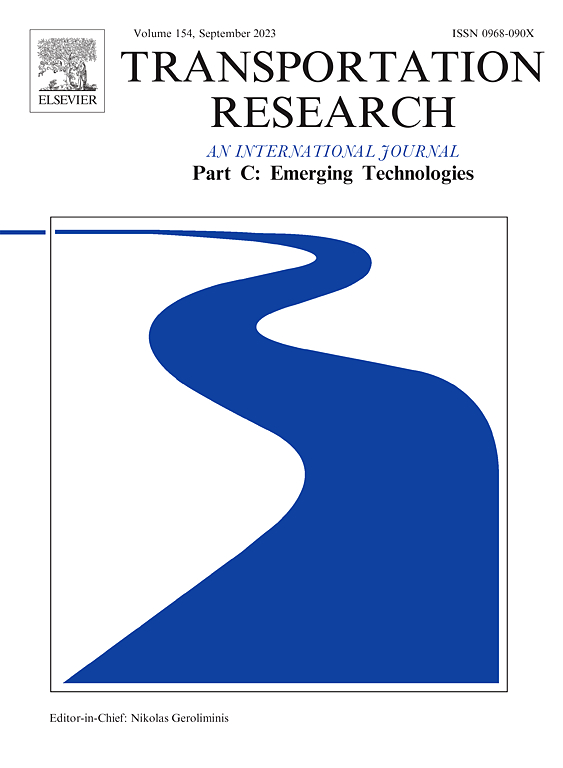Offline planning and online operation of zonal-based flexible transit service under demand uncertainties and dynamic cancellations
IF 7.6
1区 工程技术
Q1 TRANSPORTATION SCIENCE & TECHNOLOGY
Transportation Research Part C-Emerging Technologies
Pub Date : 2024-11-01
DOI:10.1016/j.trc.2024.104715
引用次数: 0
Abstract
This paper introduces a comprehensive framework for planning and operating a zonal-based flexible transit (FT) service, a public transit mode designed to accommodate uncertain demand patterns. The framework addresses both offline planning based on stochastic demand distributions and cancellations, as well as online routing considering real-time orders and cancellation behaviour. Offline interzonal route planning is formulated as a two-stage recourse problem, while the intrazonal routing problem is modelled using a Markov decision process (MDP) that incorporates online information. To solve the problem, a service reliability-based decomposition method is employed to divide the problem into three mixed-integer subproblems. The first subproblem focuses on designing interzonal routes up to a specific demand level, taking into account a designated cancellation probability as determined by reliability measures. An insertion heuristic is developed for this subproblem to improve the solution efficiency. The second subproblem allocates passengers from certain categories to vehicles based on the passenger volume designated by reliability measures. Lastly, the third subproblem refines the vehicle intrazonal route according to the passenger assignment from the previous subproblem. The reliability measures are optimised iteratively until no further improvements are observed in consecutive iterations. The proposed FT service’s performance is evaluated using numerical simulations based on real New York City (NYC) taxi demand data, illustrating the effectiveness of the integrated planning and operational approach in accommodating uncertainties in on-demand transit systems.
需求不确定和动态取消情况下基于分区的灵活公交服务的离线规划和在线运营
本文介绍了一种规划和运营分区灵活交通(FT)服务的综合框架,这是一种为适应不确定需求模式而设计的公共交通模式。该框架既涉及基于随机需求分布和取消的离线规划,也涉及考虑实时订单和取消行为的在线路线规划。离线区间路线规划被表述为一个两阶段追索问题,而区间内路线规划问题则使用一个包含在线信息的马尔可夫决策过程(MDP)来建模。为解决该问题,采用了基于服务可靠性的分解方法,将问题分为三个混合整数子问题。第一个子问题的重点是根据特定的需求水平设计区间路线,同时考虑到由可靠性措施确定的指定取消概率。针对该子问题开发了一种插入启发式,以提高解决效率。第二个子问题是根据可靠性指标指定的乘客量,将某些类别的乘客分配给车辆。最后,第三个子问题是根据前一个子问题的乘客分配情况完善车辆的区内路线。对可靠性指标进行迭代优化,直到在连续迭代中观察不到进一步的改进。根据真实的纽约市(NYC)出租车需求数据,通过数值模拟对拟议的 FT 服务性能进行了评估,说明了综合规划和运营方法在按需运输系统中适应不确定性的有效性。
本文章由计算机程序翻译,如有差异,请以英文原文为准。
求助全文
约1分钟内获得全文
求助全文
来源期刊
CiteScore
15.80
自引率
12.00%
发文量
332
审稿时长
64 days
期刊介绍:
Transportation Research: Part C (TR_C) is dedicated to showcasing high-quality, scholarly research that delves into the development, applications, and implications of transportation systems and emerging technologies. Our focus lies not solely on individual technologies, but rather on their broader implications for the planning, design, operation, control, maintenance, and rehabilitation of transportation systems, services, and components. In essence, the intellectual core of the journal revolves around the transportation aspect rather than the technology itself. We actively encourage the integration of quantitative methods from diverse fields such as operations research, control systems, complex networks, computer science, and artificial intelligence. Join us in exploring the intersection of transportation systems and emerging technologies to drive innovation and progress in the field.

 求助内容:
求助内容: 应助结果提醒方式:
应助结果提醒方式:


